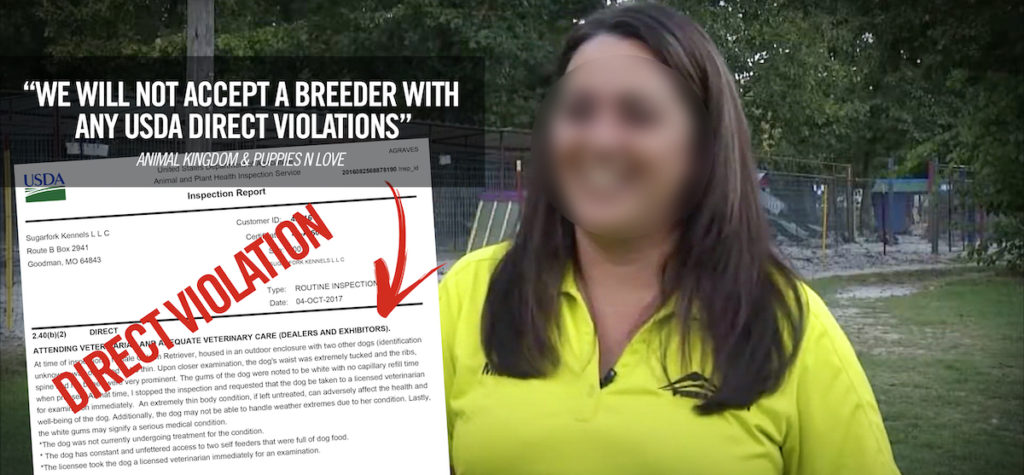
#SavethePuppies Part Two: The Evidence Tells the Story
- Lain Kahlstrom and Tina Meredith
Arizona law prohibits pet stores from purchasing puppies from breeders with recent and severe violations of the federal Animal Welfare Act on their record. Yet, five pet stores in Arizona called “Puppies ‘N Love” and “Animal Kingdom” have done exactly that.
Owner Frank Mineo insisted that his pet stores “continue to scrutinize inspection reports on our breeders and make them available in our stores” in a 2017 news release.
Yet, investigators with Animal Wellness Action and Bailing Out Benji have unearthed evidence to the contrary. The Mineos’ business seems to have purchased more than 220 puppies from two separate breeders cited by Animal Care inspectors with the U.S. Department of Agriculture.
In recent years – due to a shift in priorities at the USDA – the agency has handed out relatively few violations of any kind. Direct violations are the most egregious type of violations, where the lives of animals are at immediate risk; and according to this Washington Post article, the trend toward not issuing citations is evident in the numbers.
In 2017, inspectors recorded 331 direct violations, and in 2018, that number had dropped more than 60 percent to just 128. So, to find two different breeders with direct violations is especially troubling given how uncommon it is.
Arizona’s state law also requires that pet stores clearly label all puppies with the breeder name, state of origin, and the USDA breeder license as well. Our investigators uncovered dozens of instances where the labeling was incorrect or incomplete, making it that much harder for the unsuspecting public to research the origins of their potential new family member.
Puppies from these dog factories have a higher incidence of illness, genetic health problems, and a lack of socialization, making them higher risk for those planning to add companion animals to their families. And that’s just the tip of this iceberg.
Federal Violations
The Federal Animal Welfare Act stipulates that commercial enterprises that house animals be licensed and inspected by the USDA on a regular basis. The AWA requires “intermediate handler” licenses for anyone “taking custody of regulated animals in connection with transporting them on public carriers” and anyone “engaged in any business in which he receives custody of animals in connection with their transportation in commerce.”
Pet stores are exempt from this licensing requirement because pet stores are specifically “a place with the puppy, buyer, and seller all meet.”
However, in the case of this pet store franchise in Arizona, all puppies bought by this organization are shipped to a distribution center and held there, prior to shipment to the stores themselves. The puppies are confined in a truck for days on end as they travel across the country. They may stay in the distribution center for a short period of time before being sent to the stores, or they may stay longer if they are deemed unfit for purchase. Some of the puppies are sick or exhausted from travel and may need veterinary care.
This particular distribution center is not licensed as an intermediate handler, and as such, is not subject to the routine USDA inspections it should have to ensure compliance with the Federal Animal Welfare Act.
In a second act of non-compliance with federal law, the Mineo family also proudly proclaims that they take their puppies to nursing homes and universities for promotional purposes. There are images and videos of these stores’ activities on Facebook that detail their visits to nursing homes and colleges, allowing residents and students to interact and play with the puppies. In order to be in compliance with the federal law, this business would need an exhibitor’s license, which it currently does not have.
Animal Wellness Action and Bailing Out Benji have submitted a complaint to the USDA, requesting that the business come into compliance with the necessary licenses and be subject to USDA inspection. We will fight tooth and claw to ensure these puppies are defended and that those breaking the law are held accountable.
Stay tuned next week to learn more about the specific enforcement problems with this Arizona law.
Donate here to stand up to breeders for the humane treatment of dogs